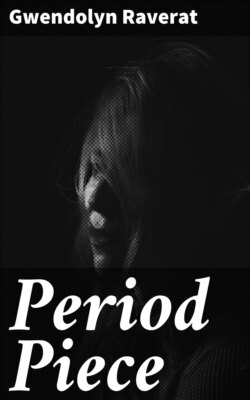Читать книгу Period Piece - Gwendolyn Raverat - Страница 6
На сайте Литреса книга снята с продажи.
'Sketching is such a nice occupation for a young lady', as they used to say in those days.
ОглавлениеIn writing to her sisters, Maud was always careful to tell them anything which might be useful to them, if they should come to England in their turn. She sends a list of words not to use: somewheres, anywheres, fix (as fix my dress), take it off of the table; 'Dick [Jebb] says location is not a good word.' She did a good deal of painting in oils, mostly of round ornamental plaques of her own designs of flowers; these are rather smudgy, but have some feeling for pattern and colour. Maud tells her young sister Carrie how she sketched King's Chapel, and suffered very much in the process from cows, little boys and rain. She goes on, in a kind, but patronizing way: 'I was ever so glad to hear about your reading. Aunt Cara said that every one who is not musical ought to be fond of poetry. So you ought to cultivate your taste in that direction. I am reading Browning, but think he is awfully hard to understand.' [Too hard for you is implied.] 'You could not help liking Shelley and Tennyson.'
The records of this first summer deal very largely with the fluctuations of two or three love-affairs among her new acquaintance; for to the very end of her life, affairs of the heart were of the greatest interest to my mother. At the end of the summer the letters culminated in the exciting proposal of a certain Mr. T. to herself; and with his rejection she left Cambridge. During this time, after a slow start, she grew to like my father more and more; and, though she never considered him romantic, he gradually became an intimate friend, so that he was consulted at once about Mr. T.'s proposal. But all that summer Romance, for my mother, fluttered lightly round the figure of a much younger man, Mr. G., who was so charming and so intelligent, and who looked so well in his flannels; even though her aunt unkindly noticed that he had bow legs and turned one foot in. However, nothing came of this affair. Mr. T., Mr. G., and my father, George Darwin, were all three Fellows of Trinity.
My father was at that time thirty-eight; the second son of Charles Darwin, who had recently died. His health had been bad as a young man; in fact he had never expected to live. His complaint sounds like some sort of nervous dyspepsia (perhaps a gastric ulcer?) but it is impossible now to make out what was wrong, or how much was physical, how much hypochondria. He had been Second Wrangler in the Tripos, and had held a Trinity fellowship. He was then called to the Bar, but was not strong enough to practise. He became interested in various scientific questions, involving mathematics; and specially in the movements of the moon and the tides. In this year, 1883, he had just been elected Plumian Professor of Astronomy; and was also re-elected to a Trinity Fellowship. Maud writes: 'G.D. had a dinner-party after he was made a fellow—and it passed off most pleasantly. In consequence he was ill all the next day—too much for his nerves and his stomach.' But he was really now better in health, and being of a warm, open, affectionate nature, wished very much to get married.
